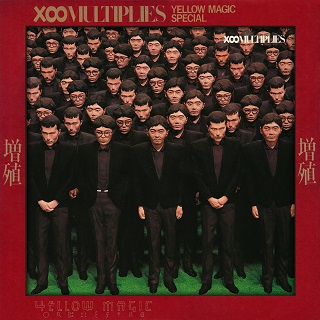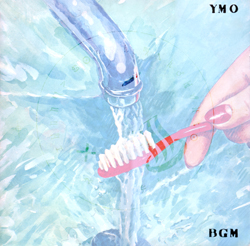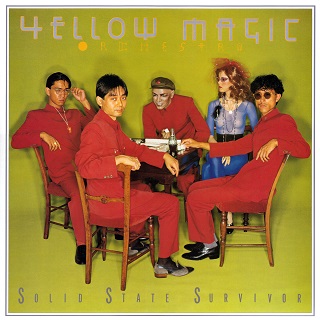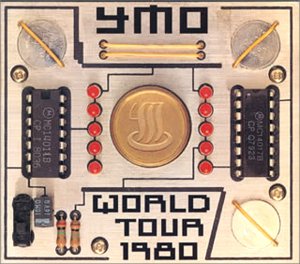
Ryuichi Sakamoto was a Japanese composer, pianist, record producer, and actor who pursued a diverse range of styles as a solo artist and as a member of Yellow Magic Orchestra (YMO). With his bandmates Haruomi Hosono and Yukihiro Takahashi, Sakamoto influenced and pioneered a number of electronic music genres.

Yellow Magic Orchestra was a Japanese electronic music band formed in Tokyo in 1978 by Haruomi Hosono, Yukihiro Takahashi and Ryuichi Sakamoto. The group is considered influential and innovative in the field of popular electronic music. They were pioneers in their use of synthesizers, samplers, sequencers, drum machines, computers, and digital recording technology, and effectively anticipated the "electropop boom" of the 1980s. They are credited with playing a key role in the development of several electronic genres, including synthpop, J-pop, electro, and techno, while exploring subversive sociopolitical themes throughout their career.

Isao Tomita, often known simply as Tomita, was a Japanese composer, regarded as one of the pioneers of electronic music and space music, and as one of the most famous producers of analog synthesizer arrangements. In addition to creating note-by-note realizations, Tomita made extensive use of the sound-design capabilities of his instrument, using synthesizers to create new sounds to accompany and enhance his electronic realizations of acoustic instruments. He also made effective use of analog music sequencers and the Mellotron, and featured futuristic science-fiction themes, while laying the foundations for synth-pop music and trance-like rhythms. Many of his albums are electronic versions and adaptations of familiar classical music pieces. He received four Grammy Award nominations for his 1974 album based on music by Claude Debussy, Snowflakes Are Dancing.

Haruomi Hosono, sometimes credited as Harry Hosono, is a Japanese musician, singer, songwriter and record producer. He is considered to be one of the most influential musicians in Japanese pop music history, credited with shaping the sound of Japanese pop for decades as well as pop music outside of Japan. He also inspired genres such as city pop and Shibuya-kei, and as leader of Yellow Magic Orchestra, contributed to the development and pioneering of numerous electronic genres.

The Roland MC-8 MicroComposer by the Roland Corporation was introduced in early 1977 at a list price of US$4,795. It was one of the earliest stand-alone microprocessor-driven CV/Gate music sequencers, following EMS Sequencer 256 in 1971 and New England Digital's ABLE computer (microprocessor) in 1975. Roland called the MC-8 a "computer music composer" and it was considered revolutionary at the time, introducing features such as a keypad to enter note information and 16 kilobytes of random access memory which allowed a maximum sequence length of 5200 notes, a huge step forward from the 8-16 step sequencers at the time. It also allowed the user to allocate multiple pitch CVs to a single Gate channel, creating polyphonic parts within the overall sequence. Due to the high price, only 200 units were sold worldwide, but it represented a huge leap forward in music technology.

Yukihiro Takahashi was a Japanese musician, singer, record producer, and actor, who was best known internationally as the drummer and lead vocalist of the Yellow Magic Orchestra, and as the former drummer of the Sadistic Mika Band. He was also a member of the group Metafive.

×∞Multiplies is a mini-album and the third studio album by Yellow Magic Orchestra released in 1980. It contains a mixture of songs and instrumentals by YMO, interspersed with comedy sketches. These sketches are performed by Snakeman Show in both Japanese and English, with YMO participating in some of them.

BGM is the fourth studio album by Yellow Magic Orchestra, released on March 21, 1981. The title stands for "Background music", though Japanese TV and press advertising alternately used "Beautiful Grotesque Music". This album was produced by Haruomi Hosono. Recording started on January 15, 1981, in an effort to release the album by March 21, 1981. The album was the first of any kind to feature the Roland TR-808, one of the earliest programmable drum machines; YMO had already been the first band to use the device, featuring it on-stage as early as 1980. In addition to the TR-808, this was also their first studio album recorded with the Roland MC-4 Microcomposer.

Yellow Magic Orchestra is the first official studio album by Japanese electronic music band Yellow Magic Orchestra, who were previously known as the Yellow Magic Band. Originally released by Alfa Records, in Japan in 1978, the album was released by A&M Records in Europe and the United States and Canada in early 1979, with the US version featuring new cover art but without the closing track of "Acrobat". Both versions would later be re-issued in 2003 as a double-disc format, with the American version as the first disc.

Solid State Survivor is the second album by Japanese electronic music band Yellow Magic Orchestra, released in 1979. Later, Solid State Survivor was released in 1982 in the UK on LP and cassette, also in 1992 in the United States on CD, but many of the songs from this album were compiled for release in the US as the US pressing of ×∞Multiplies (1980), including the tracks "Behind the Mask", "Rydeen", "Day Tripper", and "Technopolis". Solid State Survivor is only one of a handful of YMO albums in which the track titles do not have a Japanese equivalent.

Technodelic is the fifth studio album by Yellow Magic Orchestra, released in 1981. The album is notable for its experimental approach and heavy use of digital samplers which were not commonly used until the mid-to-late 1980s, resulting in a more minimalist and avant-garde sound compared to their previous work.
Sketch Show was a Japanese electronic music duo formed in 2002 by two of the three former members of Yellow Magic Orchestra, Haruomi Hosono and Yukihiro Takahashi. In some live shows, Ryuichi Sakamoto joined in band performances, which eventually led to the three readopting the YMO name in the latter half of the decade.

UC YMO: Ultimate Collection of Yellow Magic Orchestra is a compilation album by Yellow Magic Orchestra. The songs were selected by keyboardist and pianist Ryuichi Sakamoto. The album was also released as a premium edition. The premium edition came with a long-sleeved white shirt emblazed with the yMo logo as well as a yMo bandana that the band wore on the 1980 world tour 'From Tokio to Tokyo', along with a special Liner Notes Booklet and an autographed print by drummer and sometimes singer, Yukihiro Takahashi. It was cataloged as MHCL 291-4 and sold in Japan for 21,000 yen.

Tokyo Joe is a 1982 album by Ryuichi Sakamoto and guitarist Kazumi Watanabe. It is a compilation of tracks from the albums Thousand Knives (1978), Kylyn (1979), Kylyn Live (1979) and the track "Tokyo Joe" which appeared on a various artists anthology Tokyo-Paris-London-New York, Dancing Night. The album was originally released in Japan in 1982, then re-released also in the Western countries in the 1990s.

WORLD TOUR 1980 is a live album by Yellow Magic Orchestra. It was recorded during the band's 1980 international tour. This is the only YMO live album to include songs originally released on X∞Multiplies; it also features six songs from YMO members made for other projects and two covers. It was released, with a book with photographs taken during the tour, as both a 2-CD set and a 3-LP set, which had a bonus track. "Jiseiki Hirake Kokoro" was originally made for a Fujifilm cassette commercial. It was included in Snakeman Show's self-titled album in mono so that the lyrics, which reference Fujifilm cassettes, could not be understood properly; it was presented here in stereo, and was included in the UC YMO compilation.

WINTER LIVE 1981 is a live album by Yellow Magic Orchestra. It was recorded during the band's 1981 tour of Japan during the winter season of November and December 1981. A set of performances were first released in Betamax and VHS in 1983, featuring illustrations by Yakov Chernikhov. This is the only YMO live album from the BGM/Technodelic era of the group ; although this album only features one song that wasn't in either BGM or Technodelic, YMO also performed "Technopolis" and "Rydeen", as well as more songs from BGM and Technodelic and the unreleased "Loop".

Paraiso is Haruomi Hosono's fourth solo album and Yellow Magic Band's first album. This album continues the tropical style of Hosono House, Tropical Dandy and Bon Voyage co., while being influenced by the music of Hawaii and Okinawa, incorporating electronic sounds that would be later developed on Hosono's and YMO's careers. YMO, The Yellow Magic Band at this point in time, was composed of Tin Pan Alley members and studio musicians, such as Hosono's former Happy End bandmate Shigeru Suzuki and future YMO members Ryuichi Sakamoto and Yukihiro Takahashi, as well as guitarist Hirofumi Tokutake.

Cochin Moon is Haruomi Hosono's fifth solo album. Initially intended as a collaboration with illustrator Tadanori Yokoo, who traveled to India alongside Hosono for inspiration; Yokoo ended up only drawing the cover, having contracted a stomach illness during the trip, rendering this as a Hosono solo album.

Thousand Knives is the debut solo album by Japanese musician Ryuichi Sakamoto. The album is named after Henri Michaux's description of the feeling of using mescaline in Miserable Miracle.

Murdered by the Music, also known as Ongaku Satsujin in Japan, is the second studio album by Japanese multi-instrumentalist Yukihiro Takahashi, released on June 21, 1980 by Seven Seas via King Records. Murdered by the Music was release whilst Takahashi was an active member of the Yellow Magic Orchestra. As well as his YMO bandmates Ryuichi Sakamoto and Haruomi Hosono, and longtime YMO collaborator Hideki Matsutake, the album also features contributions from Sandii and Makoto Ayukawa of Sheena & the Rokkets.



















